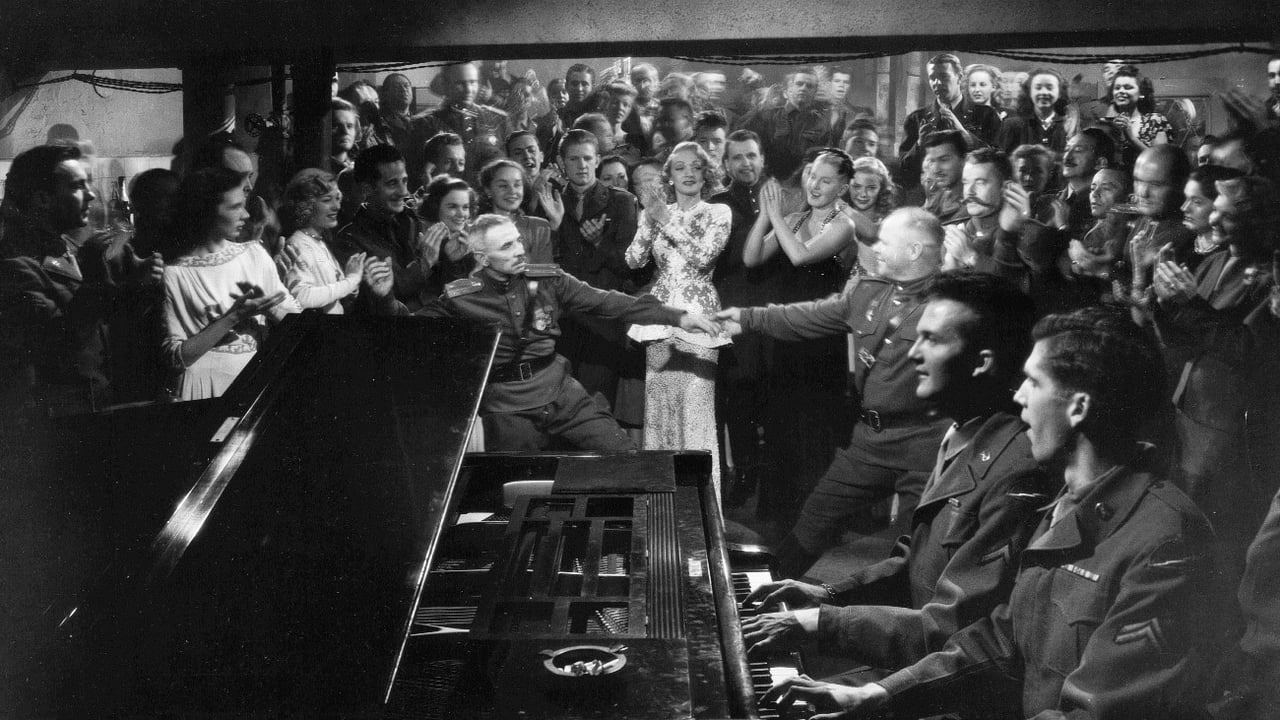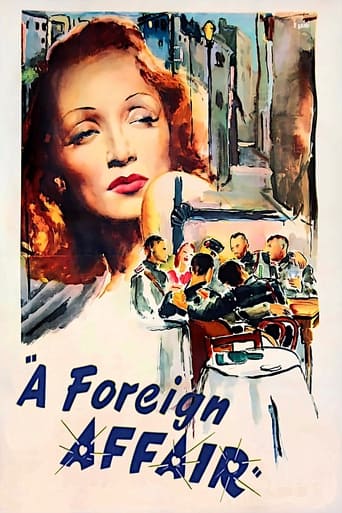AniInterview
Sorry, this movie sucks
Senteur
As somebody who had not heard any of this before, it became a curious phenomenon to sit and watch a film and slowly have the realities begin to click into place.
PiraBit
if their story seems completely bonkers, almost like a feverish work of fiction, you ain't heard nothing yet.
Bob
This is one of the best movies I’ve seen in a very long time. You have to go and see this on the big screen.
evc-11418
To me, this is about Jean Arthur -- popular, but embarrassing to be above Marlene D. on the marquis. She can be adorable, but officious and trite here - ineffective. She's not the strongest talent, but really good in some things, thanks to some beauty and personality pluses. It makes me wonder how people felt about a serious subject being almost flippantly handled in many regards. If I were a Congresswoman (probably few at that time), I'd object to Arthur's characterization.
jacobs-greenwood
Directed by Billy Wilder, with a screenplay he co-wrote with Charles Brackett and Richard Breen (adapted by Robert Harari) that was based on David Shaw's story, this essential comedy drama romance stars Jean Arthur, Marlene Dietrich, and John Lund. The clever screenplay writing was nominated for an Oscar, as was the film's B&W Cinematography.Arthur plays Congresswoman Phoebe Frost, who along with others (played by Raymond Bond, Boyd Davis, Robert Malcolm, Charles Meredith, and Michael Raffetto) are sent to post World War II Berlin to investigate U.S. soldiers' conduct, find war criminals, etc.. What they find are shocking conditions and a rampant black market. Frost even hears that the mistress of a war criminal, Erika Von Schluetow (Dietrich) is being protected, and lives in an area near where the congressmen are staying.So Frost gets Captain John Pringle (Lund) to help her find Erika. When the two women finally do meet, the scenes between them are priceless; their banter is both funny and insightful. Unbeknownst to Frost, the captain is the one who's protecting Erika! Pringle, of course, is drawn to both women, who are diametrically opposed to each other - Frost the prim, proper, moral one; Erika less so as one who's used to having to do anything to survive.Millard Mitchell plays Colonel Rufus J. Plummer, who manages the occupying forces and the busybody congressmen. Peter von Zerneck plays Hans Otto Birgel. Stanley Prager and William Murphy also appear.
calvinnme
post war occupied Germany! Jean Arthur is a U.S. congresswoman from Iowa - and I mean straight-laced right out of the "Two Grecian Urns" scene in The Music Man - and has flown over along with other congresspersons to occupied Germany to report on conditions there. Her character's last name of Frost is very descriptive. Frost's first drive through the American sector, supervised by Col. Plummer (Millard Mitchell) is hilarious. She sees American soldiers fraternizing everywhere and the topper is a woman pushing a baby carriage sporting an American flag! Jean Arthur's expressions are priceless. The congresswoman's frost is uncomfortably melting. And the whole experience leaves her shocked yet somewhat sexually curious, as though she was a teenager.Marlene Deitrich plays a German nightclub singer, Erika, who lives in the ruins of Berlin, and you'd be surprised what's important when your city and country are in complete ruins - soap, toothpaste and toothbrush, and shampoo become of vital importance. Erika is a smart woman who knows how to use her sex appeal to get what she wants. Her target - American captain John Pringle played by John Lund. You can forgive Erika for doing what she did - trying to survive. But Lund's Pringle plays this like a complete dope. You'd have to believe American casualties were very high for him to rise through the ranks to the level that he is, seeing that he doesn't seem to get that Erika may like him, but she is basically using him and his rank to survive.Well, Frost does some digging and realizes that Deitrich's character is an ex-Nazi who is being protected by some American officer - she doesn't just know who yet. Unfortunately she confides in Captain Pringle. Somehow he must distract her from her mission. Now some of what I've told you is true and some isn't actually what it seems to be. I'll let you watch and find out.This is almost a perfect movie - I love that the two female leads are in their 40's and are playing romantic leads, not grandmas. And Deitrich still has that Blue Angel charm and magnetism when she sings her numbers at the rundown bombed out nightclub. What I don't love - and maybe it was necessary to get it past the censors considering the rest of the material - was Millard Mitchell's character pontificating when leading the entourage of congresspersons on the tour of Berlin. The theme went something like - If only we could get these people to love hamburgers and hot dogs and get the kids to start playing baseball something like the Third Reich could never happen again. Billy Wilder wrote and directed this one, so I know he knew it was more complex than that, but sometimes you had to make concessions to get script approval in the age of the production code, and I think that is probably what that was all about.I highly recommend this one. It's another example of Billy Wilder taking a slice of the past that is long gone and making it timelessly funny and witty.
wvisser-leusden
'A foreign affair' provides good entertainment in a typical mid 20th-century style. Showing morals and attitudes that aren't ours anymore. Marlene Dietrich's sparkling presence fits in well, lifting 'A foreign affair' up to its timeless dimension.Maybe a little history comes in handy as well: situated in the war-torn Berlin of 1947. 'A foreign affair' deals with the desperate poverty of the German civilians who survived the Second World War. It was 'Stunde null' (= zero hour) for them: the war lost, about 35% of their country annexed by other nations, the cities destroyed, a poor living from day to day without steady earnings, and the women permanently at risk of sexual abuse by the occupying foreign soldiers.

